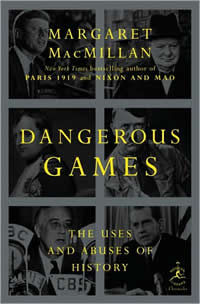Book Notes
 Margaret MacMillan, Dangerous Games; The Uses and Abuses of History (New York: Modern Libary, 2009), 188pp.
Margaret MacMillan, Dangerous Games; The Uses and Abuses of History (New York: Modern Libary, 2009), 188pp.
Margaret MacMillan is a Canadian historian, warden of St. Antony's College at Oxford University, and author of the award-winning book Paris 1919 (2003). The present book is the result of lectures she gave at the University of Western Ontario in the fall of 2007. The book retains the informality of a lecture, which makes for easy reading. With the scholar's eye for careful nuance, in eight short chapters she shows how and why history is important, and the ways we use and abuse it. Her book reminded me of the proverb that good judgment comes from experience ( = history), and experience comes from bad judgment.
With history we try to make the complex past more simple by identifying some meaning, purpose, or pattern. Augustine saw divine purpose in history, Marx the inexorable march of material forces, and Asians only eternal cycles. Francis Fukuyama even argued that the triumph of western liberalism marked the "end of history" (a view he later retracted). We use history to escape the present, construct a nostalgic past, appeal to authority, and even to rectify the past with a demand for modern reparations. History is far too important, says MacMillan, to concede to amateurs, to political ideologues, sweeping generalizations, or oversimplified complexities. She would thus raise the bar of historical vigor. Despite our notoriously unreliable memories, we should not concede that we can't know "what really happened" in the past; there is an "irreducible core" to past events that we can know.
National myth-making about past glories and grievances is a special source of distortions, suppressions, and flat-out falsifications (cf. Pat Tillman and Jessica Lynch). Good history deconstructs bad myths. Nations, as we understand them, are in fact a recent development of the last two hundred years, but that hasn't stopped spurious appeals to imaginary past histories. At its best, history can educate us, but even here there are murky areas, like what to include or omit from a museum exhibition about the Enola Gay or a school curriculum about a past war. Even public holidays like Columbus Day provoke historical controversy. MacMillan draws upon concrete examples both current and ancient, from Afghanistan to Zimbabwe, to show how history is a proper source for humility, self-awareness, and healthy skepticism. "In the end," she writes in the last sentence of the book, "my only advice is use it, but always handle history with care."


